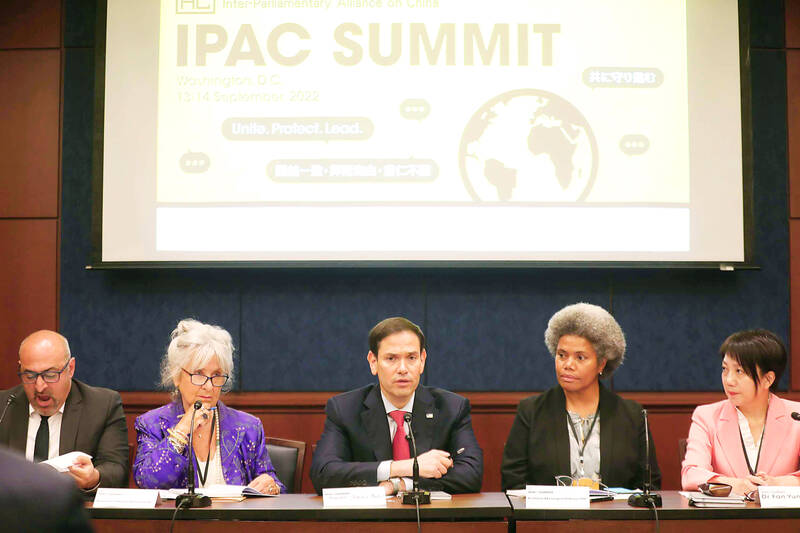The Inter-Parliamentary Alliance on China (IPAC) yesterday urged democracies to support Taiwan, rearrange supply chains and impose sanctions on Chinese officials, a day before the opening of the 20th National Congress of the Chinese Communist Party (CCP).
Chinese President Xi Jinping (習近平) is expected to secure a third term in power, showing that “the CCP has no intention of moderating its belligerent policies at home or abroad,” the international group of lawmakers wrote in a news release.
“Xi’s re-selection will also see a concentration of power not seen since the Mao [Zedong (毛澤東)] era, with the CCP’s authoritarian rule transformed into a personal dictatorship,” the alliance said.

Photo: CNA
“The CCP under Xi’s leadership has perpetrated industrial scale human rights abuses in the Uyghur Region, violated international agreements on Hong Kong’s autonomy and provided tacit support to Russia’s brutal invasion of Ukraine while ramping up military threats against Taiwan,” it said.
Since China has shown no sign of easing its “oppressive policies,” democratic countries are urged to “renew their efforts to safeguard human rights, democracy and the international rules-based order,” the alliance said, calling for “urgent action” to counter Beijing.
Democratic governments should impose sanctions targeting Chinese officials responsible for carrying out repressive policies in the Uighur region, Tibet and Hong Kong, it said.
“Audits of supply chains dependency” must be conducted to ensure they are diverse, resilient and “untainted by forced labor abuses” in China, the alliance said.
Democracies are also urged to develop political and economic ties with Taiwan, “including through bilateral and multilateral trade and investment deals,” it said.
Extradition treaties with China and Hong Kong must be repealed “to protect diasporic groups at risk of the PRC’s [People’s republic of China] transnational repression,” it said.
IPAC is comprised of more than 200 lawmakers from national legislatures and the European Parliament, many of whom are sanctioned by Beijing. Lawmakers who signed the statement hailed from the legislatures of Albania, Australia, Belgium, Canada, the Czech Republic, Denmark, France, Germany, New Zealand, Norway, Sweden, Ukraine, the UK, the US, the European Parliament and elsewhere.
Separately, US senators Jim Risch, a Republican, and Bob Menendez, a Democrat, on Friday said that the CPP under Xi’s rule has become “more active and more emboldened than ever before.”
Menendez is chairman of the US Senate Committee on Foreign Relations and Risch is a ranking member.
“As the 20th Party Congress begins this weekend and Xi Jinping consolidates his power and preaches ‘common development for all mankind,’ the CCP’s widespread campaign of oppression and economic instability will continue,” they wrote in a joint statement.
“From its predatory economic behavior to the crushing of the religious and cultural autonomy of Tibet, its campaign of genocide against the Uyghur people, its unrealistic ‘zero COVID’ policies, and the imposition and exportation of digital authoritarianism — the Communist Party today under Xi is more active and more emboldened than ever before,” they said.
China cannot claim to be committed to resolving the world’s security challenges while threatening Taiwan with war and furnishing Russia with energy and metal to continue its war in Ukraine, they said.
“Xi securing a third term will only continue this path of repression, economic coercion, and regional instability,” they said.

SECURITY: As China is ‘reshaping’ Hong Kong’s population, Taiwan must raise the eligibility threshold for applications from Hong Kongers, Chiu Chui-cheng said When Hong Kong and Macau citizens apply for residency in Taiwan, it would be under a new category that includes a “national security observation period,” Mainland Affairs Council (MAC) Minister Chiu Chui-cheng (邱垂正) said yesterday. President William Lai (賴清德) on March 13 announced 17 strategies to counter China’s aggression toward Taiwan, including incorporating national security considerations into the review process for residency applications from Hong Kong and Macau citizens. The situation in Hong Kong is constantly changing, Chiu said to media yesterday on the sidelines of the Taipei Technology Run hosted by the Taipei Neihu Technology Park Development Association. With

CARROT AND STICK: While unrelenting in its military threats, China attracted nearly 40,000 Taiwanese to over 400 business events last year Nearly 40,000 Taiwanese last year joined industry events in China, such as conferences and trade fairs, supported by the Chinese government, a study showed yesterday, as Beijing ramps up a charm offensive toward Taipei alongside military pressure. China has long taken a carrot-and-stick approach to Taiwan, threatening it with the prospect of military action while reaching out to those it believes are amenable to Beijing’s point of view. Taiwanese security officials are wary of what they see as Beijing’s influence campaigns to sway public opinion after Taipei and Beijing gradually resumed travel links halted by the COVID-19 pandemic, but the scale of

A US Marine Corps regiment equipped with Naval Strike Missiles (NSM) is set to participate in the upcoming Balikatan 25 exercise in the Luzon Strait, marking the system’s first-ever deployment in the Philippines. US and Philippine officials have separately confirmed that the Navy Marine Expeditionary Ship Interdiction System (NMESIS) — the mobile launch platform for the Naval Strike Missile — would take part in the joint exercise. The missiles are being deployed to “a strategic first island chain chokepoint” in the waters between Taiwan proper and the Philippines, US-based Naval News reported. “The Luzon Strait and Bashi Channel represent a critical access

Pope Francis is be laid to rest on Saturday after lying in state for three days in St Peter’s Basilica, where the faithful are expected to flock to pay their respects to history’s first Latin American pontiff. The cardinals met yesterday in the Vatican’s synod hall to chart the next steps before a conclave begins to choose Francis’ successor, as condolences poured in from around the world. According to current norms, the conclave must begin between May 5 and 10. The cardinals set the funeral for Saturday at 10am in St Peter’s Square, to be celebrated by the dean of the College